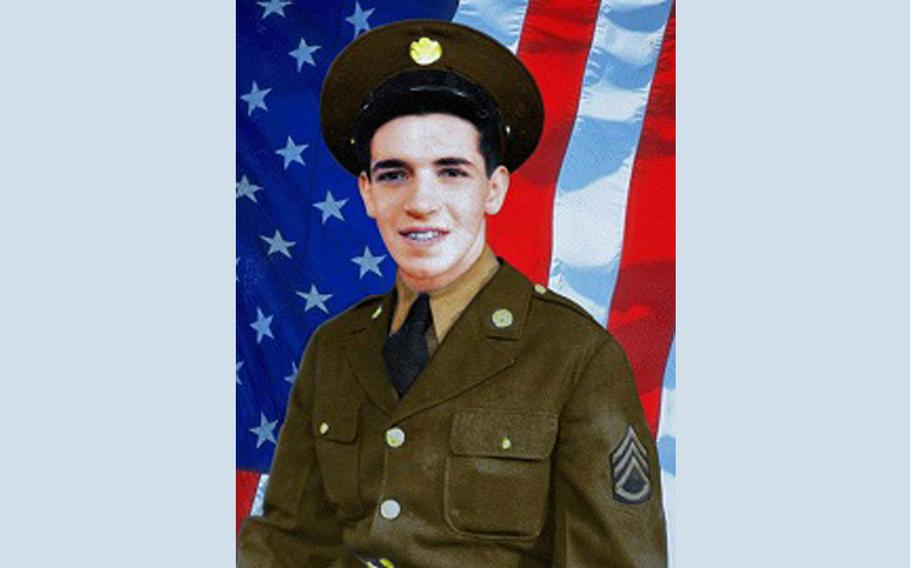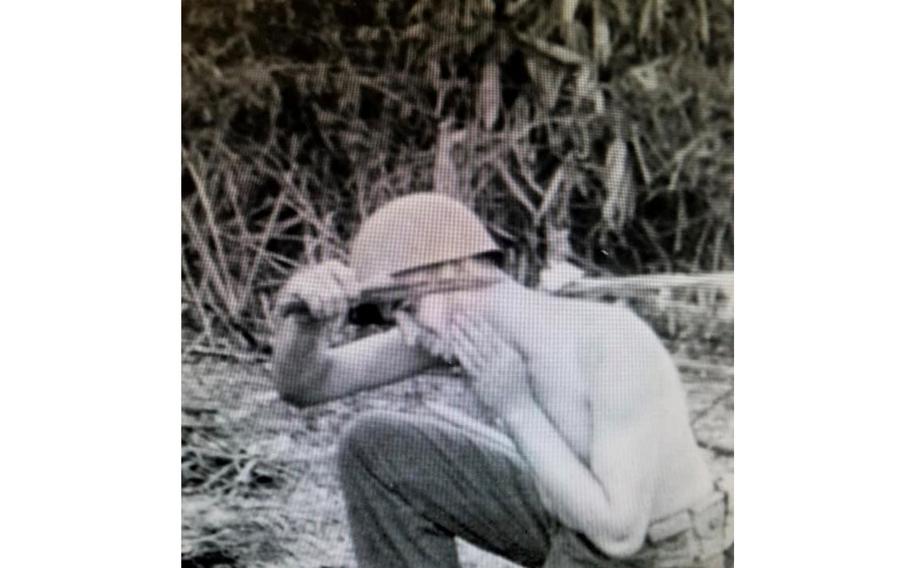
Robert Passanisi, a staff sergeant who served with Merrill’s Marauders in Burma during World War II, died April 26, 2022, at this home in Lindenhurst, N.Y., at age 97. (U.S. Army)
Robert E. Passanisi, who as a 17-year-old doctored his birth certificate in 1942 so that he could join the Army and ended up in Burma as one of Merrill’s Marauders, died on Tuesday at his home in Lindenhurst, N.Y. He was 97.
His death comes just days after that of fellow Marauder Raleigh Nayes, who died April 21 in Chippewa Falls, Wis., at age 99.
Only three of the roughly 3,000 original Merrill’s Marauders now remain living.
Passanisi died in his home while in hospice care following surgery late last fall for kidney problems, his son Robert Passanisi, Jr., said in a phone interview Friday.
The elder Passanisi began attending annual reunions of Merrill’s Marauders veterans in the 1950s and over time became the unit’s historian and go-to guy for all things Marauders, his son recalled.
He was instrumental in helping family members and descendants of Marauders in locating and retrieving military records so that, for example, veterans could receive medals the military had neglected to actually present, he said. In 2010, he was key in identifying remains of three Marauders who had been missing in action in Burma since the war, he said.
“There were hundreds of descendants who were helped by his perseverance in getting the information to them or help them have final closure,” Passanisi said.
He was inducted into the Army’s Ranger Hall of Fame in 2016. The Rangers trace their lineage to the Marauders.
In recent years, the aging veterans played a major role in lobbying Congress to recognize the contributions of the entire Marauders outfit — formally known as the 5307th Composite Unit — with the Congressional Gold Medal. When Congress passed the bill to do so in September 2020, Passanisi said in a news release that he felt he was “floating on air.”
A virtual Congressional Gold Medal ceremony is scheduled for May 25, hosted by House Speaker Nancy Pelosi’s office and broadcast on C-Span.
The Marauders’ namesake was Brig. Gen. Frank Merrill, who led the Army unit as it fought behind Japanese lines in Burma during the war.
The unit’s ultimate mission was to capture the Myitkyina airfield in northern Burma, which it did on May 17, 1944, but not before a 1,000-mile slog over the Himalayan foothills, through jungles and enemy resistance.
It was not until August that the Japanese were fully routed from the town of Myitkyina, by which time fewer than 200 Marauders were still standing, their ranks thinned by disease, parasites, exhaustion, malnutrition, wounds and death.
Passanisi was born on July 24, 1924, in Brooklyn, where his father was a bricklayer. The youngest of 12 children, the teenager learned to repair radios from his older brother, who was in that business, Passanisi said in an oral history in 2019 videotaped by his local library.
In 1942, the 17-year-old Passanisi “manipulated” the ink on his birth certificate so that he could join the Army, the only service branch recruiting high-school dropouts, he said.
He volunteered for the Burma mission, where he was a radio operator and repairman with the 1st Battalion.

Robert Passanisi shaves with a bayonet while serving with Merrill’s Marauders in Burma during World War II in this undated photo. (Bob Passanisi Jr.)
Mules were central to the lives of Marauders, and Passanisi jokes in the video about a city boy adjusting to the creatures.
“Everything we had we carried on our backs or carried on our mules,” he says in the video. “I, a kid from Brooklyn, had to take care of a stinkin’ mule. I gotta say that after a while you became dependent upon the mule, and you appreciated the mule, and you took care of him.”
Passanisi was hospitalized with malaria, among other ailments, during the summer assault on the town of Myitkyina but returned to the front line despite not being fully recovered, his son said.
He was discharged from the Army as a staff sergeant in July 1945 and within a few years was operating his own radio and television repair shop. He eventually completed high school, earned an electrical engineering degree and worked for several electronics and aerospace companies, his son said.
A funeral mass is scheduled for Monday at Our Lady of Perpetual Help in Lindenhurst, followed by burial at Breslau Cemetery.